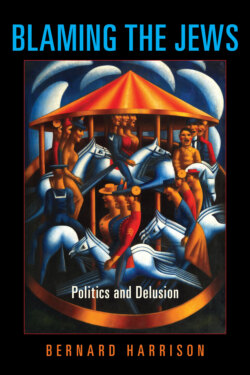Читать книгу Blaming the Jews - Bernard Harrison - Страница 9
На сайте Литреса книга снята с продажи.
ОглавлениеPREFACE
A DECADE AGO, RAEL JEAN Isaac published a review of an earlier book of mine on antisemitism. Her review was generally approving, though it also contained some sharp and well-deserved criticisms, with which I now find myself wholly in agreement. Isaac’s (2009) review concludes:
Harrison focuses on today’s left wing, and does a fine job of showing how it has come about that “the ‘anti-racist’ liberal left finds itself currently up to its neck in the oldest form of racism.” But at the end of the day we are left with the larger question—one hopes Harrison will one day turn his formidable analytic talents to it—“Why, over time, do so many different roads, left, right, religious, anti-religious, lead to anti-Semitism?” If nothing else it speaks to the poverty of the human imagination that it comes back endlessly to the same imaginary demons and, impervious to reason or logic, sinks into the same familiar collective madness.
The present book is my attempt, more than a decade later, to do what Isaac asked of me: to answer the above taxing but entirely legitimate question. I have returned, in this new book, to many of the issues of contemporary antisemitism that dominated the first. But this time, I have tried to set them in the wider context of a new account of what antisemitism is, of the functions it serves in non-Jewish politics and culture, and of why it has enjoyed the protean power it has displayed over the centuries to continually re-create itself in an extraordinary variety of political and religious contexts.
A non-Jew such as myself would have found it difficult to even address these questions without an immense amount of sympathetic help from friends and colleagues, Jewish and non-Jewish. Those from whom I have learned most include Edward Alexander, David Conway, Anthony Julius, Lesley Klaff, Michael Krausz, Matthias Kuentzel, Deborah Lipstadt, Kenneth Marcus, Cynthia Ozick, Alvin Rosenfeld, Abigail Rosenthal, Tammi Rossman-Benjamin, and Kenneth Waltzer. The critical comments of my wife, Dorothy Harrison, who read the final version of the manuscript in its entirety, led me to excise a number of tediously overwritten passages, which must once have seemed good to me but no longer did so when seen through her eyes. Others from whose advice the book has gained much include Jonathan Campbell, Amy Elman, the late Ilan Gur-Zeev, David Hirsh, Alan Johnson, Peter Hacker, Menachem Kellner, Michael Leffell, David Patterson, Steve Rich, Leona Toker, Stephen Riley, Alan Tapper, and Elhanan Yakira. Any remaining errors, from which they and many others have not succeeded in saving me, are entirely my own.
Katelyn Klingler did a splendid job of ridding the manuscript of a host of typos and minor infelicities. To her, to those mentioned above whom I have consulted in person, and to the many more whose books and essays have helped me see new complexities or turn new corners in the discussion, my heartfelt gratitude is due.
